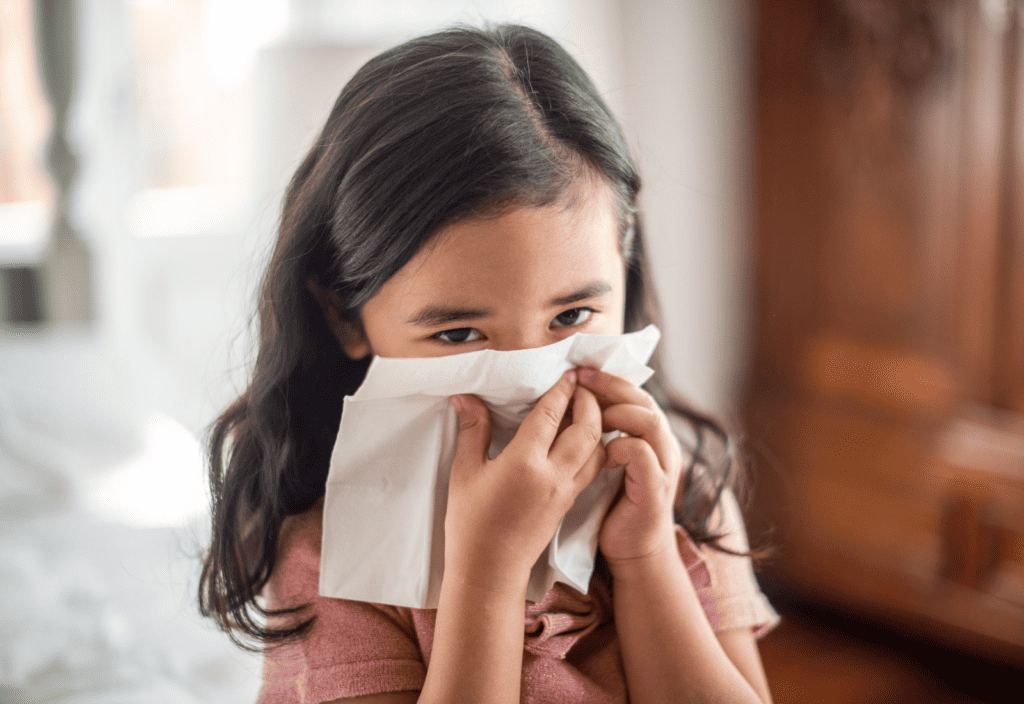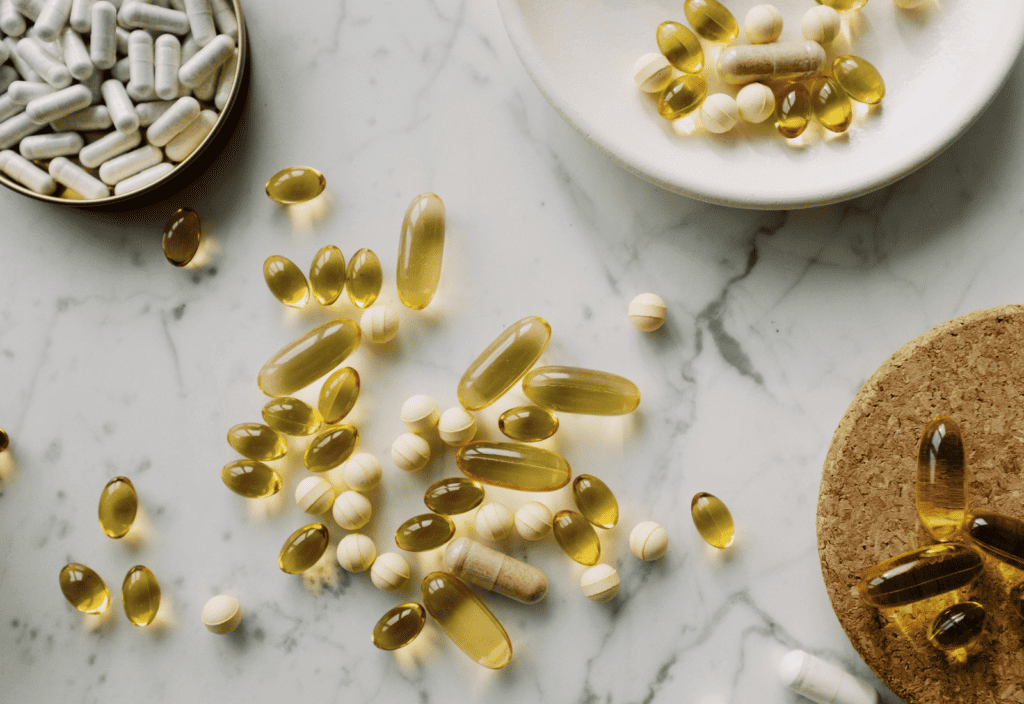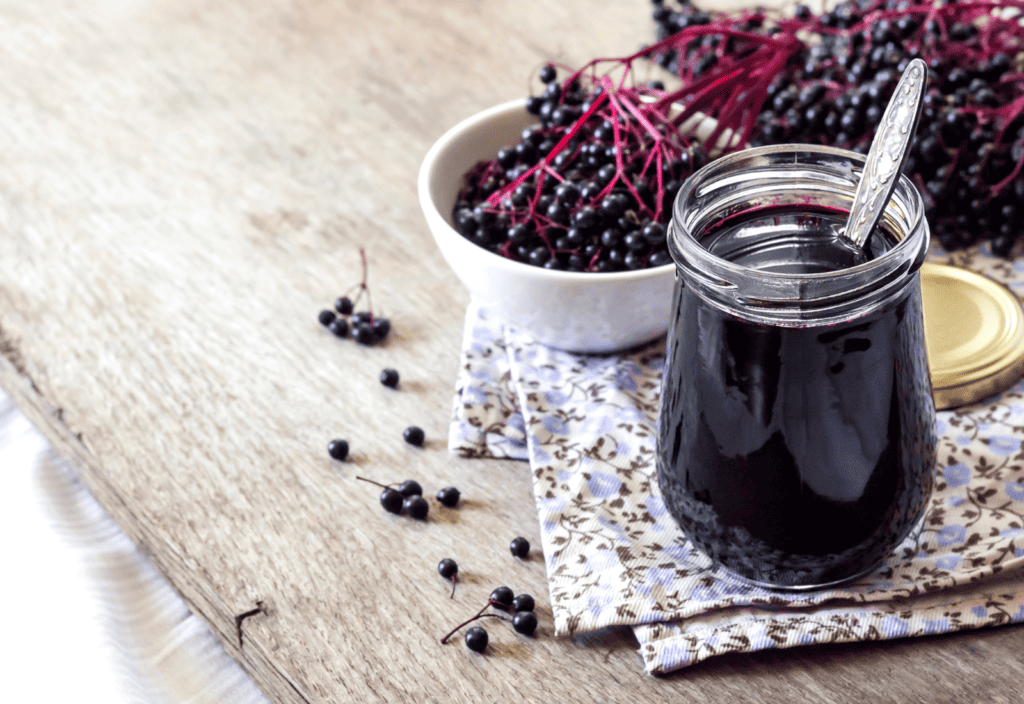Cold season is upon us, and it can be rough especially if you don’t have the tools you need to prevent and shorten the duration of colds and other respiratory infections. Let’s dig into the data and learn what prevents a cold or reduces duration of the cold.

The average adult has 2-4 colds per year while the average child has 4-12 depending on what source you go with. Wouldn’t it be nice to cut that in half? I believe most people can, but it will take being really intentional about daily habits as well as what to keep in your vitamin and supplement cabinet.
Is it really possible to prevent and shorten the duration of colds?
Absolutely, but don’t take my word for it. In this post, the science will do the talking. I am a firm believer of the Benjamin Franklin quote “an ounce of prevention is worth a pound of cure.” Despite popular belief, that we automatically will catch something when we are exposed to it, this is often not the case.
There are a whole host of things we can do to prepare our bodies to fight off the yuckies before they set in. Let’s dive into what prevents a cold.
Getting Enough Sleep
Getting inadequate sleep for even a couple of nights makes us more susceptible to the common cold. During the study, “Behaviorally Assessed Sleep and Susceptibility to the Common Cold” researchers monitored the sleep of participants then isolate them and gave them nasal drops containing a rhinovirus. Those who got less sleep, were more likely to develop a cold.
Adults need at least seven hours of quality sleep while teens need eight to ten and children need nine to 12. Some may discount sleep, because it seems so basic, but it’s a powerful strategy for staying well. As I wrote about last week, in my post “How to Beat the Winter Blues” sleep also impacts our mood and eating habits.
Eating A Colorful Diet
The Mediterranean diet is shown to reduce occurrences of colds when patients switch to it from a standard diet. The Mediterranean diet is a whole-food diet that is rich in fruits, vegetables and fish and low in highly processed foods and added sugar. The diet is also associated with a reduction in asthma and wheezing.
Long-term research recently published in the journal Circulation shows five servings of fruits and vegetables is ideal for longevity. Ideally, the combination was three veggies and two fruits. Those who ate more than that didn’t see a significant decrease in their risk of death.

This post contains affiliate links. At no additional cost to you, I may earn a small commission on qualifying purchases.
As we all know, life happens, and we don’t always achieve the perfect whole food, made from scratch meals. There is some evidence that supplementation can be beneficial. A Cambridge study confirmed that fruit/veggie capsules lessened the number of days people suffered from moderate cold symptoms.
Avoiding Sugar and Ultra Processed Foods
Sometimes it can be difficult to get in the recommended amounts of fruits and veggies in a day. Once you add in a few servings of sugary and/or processed things, it goes from hard to impossible. These low-quality food choices take the place of foods that your body needs in order to be function at its best and be healthy.
Consuming high amounts of sugar negatively impacts the immune system for the same reason diabetic individuals are at higher risk for illness (sugar keeps white blood cells from doing their job). Because of this, it’s not a bad idea to completely omit sugar when cold or illness symptoms occur. Sugar, like dairy, is also a food that stimulates nasal mucus production, so cutting it out is a two for one.
Ultra-processed foods are things like potato chips and Little Debbie’s—they are void of nutrition and bad for every ailment you can dream up. Emerging research suggests that individuals who consume high amounts of ultra-processed foods often have nutritional deficiencies and less that optimal immune system function.
Consuming Probiotics
Probiotics are doses of good bacteria. They contribute to our microbiome, which has become an especially popular topic in recent years. Probiotics do seem to have the ability to lessen occurrences and severity of the common cold and other illnesses. Other studies show probiotics can reduce flu-like symptoms in children.
You can consume probiotic foods by eating a high-quality yogurt, tempeh, miso or sauerkraut or drinking kombucha or kefir. Not into those things? You can take a probiotic in a pill form. Keep in mind that some probiotics are created with specific needs in mind. This post by Cleveland Clinic talks about what to look for in a probiotic.
One on my list to try it Just Thrive. I recently watched an hour-long podcast episode on Max Lugavere’s The Genius Life (awesome podcast btw) about the product. Their product utilizes probiotic spores that are designed for superior survival, which is a new concept. They also selected what they believe to be the most appropriate strains of probiotics rather than just packing in the most strains, which is a common marketing tactic for probiotics.
Managing Stress
Psychological stress has been proven to increase likelihood of coming down with the common cold. Major life events as well as feeling overwhelmed with day-to-day life are contributing factors in how likely someone is to develop a cold. Obviously, we can’t always control the stress in our lives, but avoiding unnecessary stress definitely has its benefits.
Lots of the things listed here can help you manage your stress: exercise, diet and quality sleep. Other powerful tools are prayer, meditation, talking with someone, spending time in nature and petting a dog (or cat).
Exercising Regularly
Physical activity matters when it comes to the common cold. Upper respiratory tract infections are reduced in physically active adults. A study in the British Journal of Sports Medicine shows about a 40% decrease in upper respiratory tract infections when comparing those who were regularly active to those who were mostly sedentary.
Most experts agree that regular moderate-intensity exercise is best as really high intensity exercise can put stress on the body and actually work against the immune system.
Certain Vitamins and Supplements
Be sure to chat with your healthcare provider to see if a supplement is appropriate for you before beginning. Popular supplements that often come up when discussing cold prevention include vitamin C, Vitamin D, zinc, echinacea and elderberry and probiotics. Let’s take a look at which ones are worth taking and which ones are over hyped.

Echinacea (maybe)
Since Echinacea has been around for a long time, I expected more definite results. Echinacea is known to increase white blood cells, which fight illnesses within the body. While many studies found favorable results, a 2014 review of research did not find it to consistently prevent or shorten the duration of colds.
Studies since then have been mixed. Many believe that some studies failed because they did not use a high-quality supplement. One report showed that supplements from a Colorado health food store failed to contain any Echinacea at all (wow!)
This is why choosing a quality supplement is essential. Look for well-known, trusted brands who offer third-party testing. Third-party testing is not required, so it is an extra step taken by companies to ensure the quality of their products.
Vitamin C
Looking at vitamin C first, a literature review showed taking vitamin C daily did not prevent frequency of the common cold, but it did shorten the duration of a cold by 10%. It may be worth taking once cold symptoms occur. Be sure to take a vitamin C in pure form and not a product like Emergen-C with lots of added sugars. Thankfully, they have removed the artificial dyes that were in the old recipe.
Vitamin D
After some years of back and forth, Harvard and others have officially stated that vitamin D does play a role in respiratory infection. Vitamin D is essential to proper immune system function. In addition, there is consistent circumstantial evidence that vitamin D may play a protective role in Covid 19 serious illness.
Most of us don’t get enough sunlight during the winter months. Some of us don’t even get enough sunlight during the summer months. More than 50% of Americans are deficient in vitamin D. This number is even higher for the elderly living in assisted living settings.
Some natural food sources of vitamin D are cod liver oil, tuna, salmon and egg yolks. If sunlight is lacking where you live and you don’t consume many of those items, vitamin D supplementation is another option. Experts like Dr. Mark Hyman recommend taking vitamin D alongside vitamin K.
Zinc
Zinc is another supplement that has been recommended on and off over the years. The most recent evidence suggests that it can shorten the duration of a cold if taken quickly at the onset of cold symptoms. The dosage is not especially clear, and experts warn against taking zinc regularly on a long-term basis as it may cause a copper deficiency.
Pure Encapsulations Zinc is a well-known, trustworthy brand that I personally use as needed.
Elderberry
A 2016 study shows reduced cold duration for air travelers. Slightly more colds occurred in the placebo group, but there was not a significant difference. The significance was found in the duration of the cold and severity of symptoms. The elderberry group had less severe colds that were shorter in duration.

My family always has elderberry syrup on hand. I make it at home rather than buy it. It’s super simple to make from dried berries. You can add fresh ginger, cinnamon and other herbs and spices for even more healing properties. Check out this simple elderberry tutorial by Wellness Mama. I use about half of the sugar (honey) that the recipe recommends.
I typically use Frontier Co-op Organic Dried Elderberries. Local honey is great if you can snag some near you. If not, look for a raw, unfiltered honey preferably in a glass container. Fresh ginger and cinnamon are available at most grocery stores. Beyond that, it’s just a filtered water, a stockpot, strainer and glass jars for storage.
If you don’t have time to make any, Gaia is trusted, high quality brand. Beware of popular brands that contain a lot of added sugar. Elderberry is great for seasonal allergies as well as colds. Another way to take it is as a tea.
There is a lot of debate on how to best use it. Rather than take it daily, we cycle it and take it with symptoms whether they be sniffles, cough, stuffy nose, etc. You can also take it prior to back-to-school, a big trip in the middle of flu season or similar.
For more information on the effectiveness of elderberry syrup, see my related post, Does Elderberry Syrup Really Work?
Garlic
A 2001 study suggests that a garlic supplement may be effective in preventing and shortening the duration of colds. While the study used a supplement, eating a ton of garlic may have the same benefit. Another study, Aged Garlic Extract Modifies Human Immunity, didn’t show a significance difference in the number of colds but did show the same lessening in severity and duration.
While I have not utilized a garlic supplement, it is a staple in our dinner meals.
My Personal Experience
From the moment, I became a mom, I became very interested in (o.k. obsessed!) with keeping my kids healthy. In the early years, I was a full-time working mom. Whew, that was a tough time. There was simply no time for sickness, so I set out to prevent it.
If you have heard of the personality trait “highly consciousness” then you know we are the ones who prevent the disasters, but we are really bad at dealing with them.
I stayed up many nights reading research and strategizing on how to keep my kids healthy. I know it sounds like a lot of work, but it has served me well and brought me great peace over the years. Of course, we can’t forget good ole genetics, so I cannot take full credit and fully realize that some kids aren’t as easy to keep healthy.
My kids are now eleven and almost eight, and I can count on one hand the times they’ve had more than the sniffles. I say that to say, I have developed a solid method for keeping my family well thanks to the amazing data health professionals and researchers share. My goal is to bring that data to you, so you don’t have to stay up all night researching ;).
Our Wellness Strategy
Our wellness strategy includes most of the things listed in this post: we prioritize sleep almost always, eat a whole food diet that’s rich in fruits and veggies, keep added sugar and ultra-processed foods low, get outside/take Vitamin D (winter months), eat lots of garlic, take elderberry with the slightest throat tickle, cycle probiotics and consume probiotic-containing foods/beverages. Zinc is on standby in the “medicine” cabinet.
In a world of marketing and claims, I hope you feel a little more confident in what prevents a cold. As always, thanks for stopping by, and thanks for trusting me to share information with you!